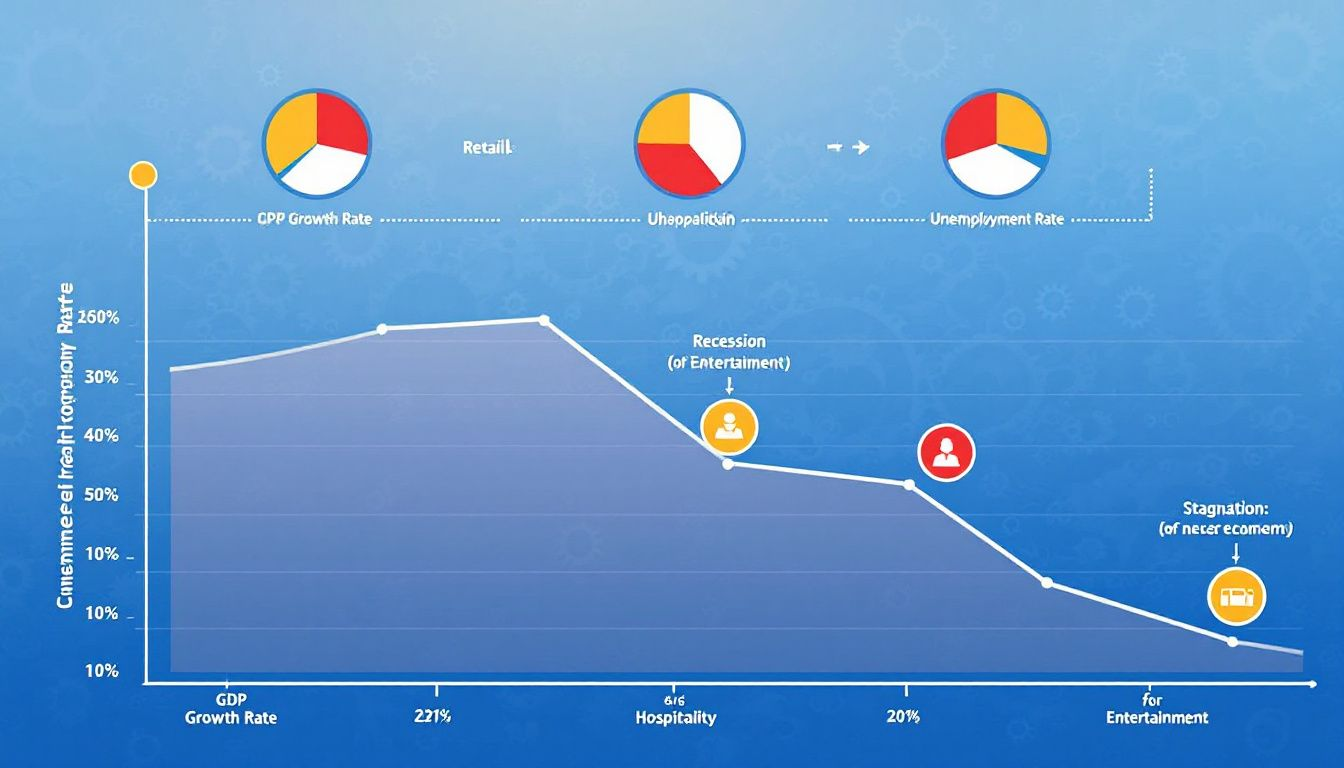Top 10 Lessons from Businesses That Thrived During Economic Downturns
When economic downturns hit, some businesses not only survive but grow stronger. What sets them apart? This article explores the key lessons from businesses that thrived during economic downturns, focusing on adaptive strategies and smart decisions.
Key Takeaways
- Businesses that adapt to changes in consumer spending and emphasize value can thrive during economic downturns.
- Leveraging technology and operational efficiency, such as digital solutions and remote work, is essential for competitiveness.
- Fostering community engagement and enhancing customer relationships through support initiatives and CSR can strengthen brand loyalty and reputation.
Want to ensure your business not only survives but thrives during economic downturns? Let’s discuss strategies tailored to your business. Book a free 15-minute call today! Click here.
Adapting to Shifts in Consumer Spending

During economic downturns, a keen understanding of consumer behavior is paramount. Successful businesses invest in understanding shifts in consumer spending patterns and adapt their strategies accordingly. This ability to quickly adjust prices and emphasize essential products allows them to remain competitive and appealing to cost-conscious consumers. Selling online has become a crucial strategy for businesses to adapt to these shifts in consumer spending.
Maintaining customer trust and loyalty through proactive communication and transparency also plays a crucial role in navigating challenging economic times.
Emphasizing Value and Affordability
In challenging economic times, consumers often prioritize value and affordability. Companies like Hyundai and The Home Depot have successfully attracted customers by offering lower prices and added value. Hyundai’s Assurance Program allowed vehicle returns without penalty for those who lost their jobs, leading to a 24% increase in sales during the January 2009 slump. Similarly, The Home Depot cut prices on over 1,000 products and provided DIY workshops, effectively catering to the needs of cost-conscious consumers.
Other businesses like Dollar Tree and Walmart thrived during the 2008 recession by focusing on affordable prices and essential products. Understanding that consumers tend to rethink their spending and turn to bargain stores during tough economic times, these companies were able to influence shopping habits and maintain strong sales.
Your customers are looking for value—are you positioning your business to attract them? Let’s explore how you can refine your approach. Schedule a free consultation now. Click here
Expanding Essential Services
Expanding essential services is another critical strategy for businesses during economic downturns. The demand for essential goods and services, such as food, pet care, and basic maintenance services like plumbing and electrical work, remains stable even during recessions. Businesses that expanded their range of essential services were crucial in meeting increased demand and ensuring their own resilience. Financial advisors play a vital role in assisting both businesses and individuals with budgeting, debt management, and tax planning during these times.
The healthcare industry, driven by an aging population and advances in technology, also exhibited growth despite economic challenges. Telemedicine companies, for instance, saw a surge in usage during the pandemic, with 37% of adults using remote health care services. By adapting their services to meet increased demand, businesses not only helped their communities but also boosted their resilience against economic uncertainties.
Leveraging Technology for Operational Efficiency

Economic downturns often push businesses to innovate and enhance cost efficiencies through technology. Implementing new technologies to optimize operations and reduce waste enables businesses to remain competitive. Focusing on operational efficiencies helps companies eliminate redundant processes and improve resource utilization, maintaining quality while driving down costs.
Is your business leveraging technology to reduce costs and improve efficiency? Let’s uncover the best digital solutions for you. Book a quick strategy call today! Click here
Implementing Digital Solutions
Adopting digital solutions is a powerful way to enhance operational efficiency. Automating routine tasks can significantly lower operational costs, allowing businesses to focus on strategic initiatives. During the pandemic, Zoom scaled its operations to meet high demand, offering a user-friendly interface and a free plan, which propelled their revenue surge by over 300%. This successful adoption of digital solutions enabled Zoom to thrive during challenging economic conditions.
The use of cloud services is another example of how technology can safeguard businesses against various crises. Cloud services ensure secure and accessible data management, providing a reliable backbone for business operations.
Overall, the adoption of digital solutions not only helps businesses survive but also thrive during economic downturns.
Remote Work Adaptations
The shift to remote work has allowed businesses to reduce overhead costs while continuing to meet customer needs effectively. Embracing remote work adaptations maintains operational efficiency and flexibility, ensuring resilience during economic challenges.
Fostering Community Engagement

Building strong community ties helps businesses maintain brand loyalty during tough economic periods. Engaging with the community and supporting local initiatives can enhance a business’s reputation and foster loyalty among customers.
Implementing Corporate Social Responsibility (CSR) strategies improves brand loyalty and maintains customer engagement during economic challenges.
Building a strong community around your business creates loyal customers who stick with you through any economy. Need help crafting a strategy? Let’s chat—schedule your call now! Click here.
Supporting Local Initiatives
Supporting local initiatives is a powerful way for small businesses to foster community engagement. Launching local support programs allows businesses to provide essential resources to their communities during economic downturns, fulfilling community needs and enhancing their reputation.
For example, Feeding America has effectively provided millions of meals to individuals facing hunger through community support programs during economic downturns. These supportive actions not only lead to increased customer loyalty but also encourage brand advocacy.
Enhancing Customer Relationships
Enhancing customer relationships is vital for businesses to retain customers and maintain loyalty during economic challenges. Fostering emotional bonds with consumers can lead to increased revenue, reduced customer turnover, and greater satisfaction. Businesses that engage emotionally with their customers can enhance loyalty, leading to sustained patronage in tough times.
Effective trust-building strategies include personalized service, special offers, and thank you notes. For instance, Patagonia’s ‘Don’t Buy This Jacket’ campaign during the 2008 recession deepened customer trust and strengthened bonds with customers, ultimately enhancing loyalty.
Innovating Product Lines

Innovation in product lines is crucial for businesses to maintain relevance and competitiveness during economic downturns. By focusing on innovation, companies can meet changing consumer needs and strengthen their competitive position.
This section will explore the introduction of new products and the diversification of revenue streams.
Are you exploring new revenue streams or product innovations to future-proof your business? Let’s strategize together! Book your free call now. Click here.
Introducing New Products
Introducing new products during economic downturns can help businesses stay competitive and relevant. For example, Airbnb innovated by providing affordable accommodations for budget-conscious travelers, allowing it to attract customers despite challenging economic conditions.
Staying attuned to changing consumer needs enables companies to innovate effectively and launch successful new products. Focusing on affordability and understanding consumer behavior enhances market presence and drives sales.
Diversifying Revenue Streams
Diversifying revenue streams is critical for business sustainability during economic downturns. Creating multiple revenue streams ensures financial stability, making businesses more resilient to economic fluctuations.
Many businesses have successfully diversified their product lines to create additional income sources. By investing in new market segments and exploring new product lines, companies can enhance their value proposition and continue serving customers during challenging economic times.
Investing in Employee Training
Investing in employee training is a crucial strategy for businesses to remain competitive and resilient during economic downturns. By enhancing employee skills and engagement, businesses can drive innovation and improve organizational performance.
Your team is your biggest asset. Are you empowering them for success? Let’s discuss effective leadership and training strategies for your business. Book a call today! Click here.
Upskilling Workforce
Upskilling the workforce can significantly enhance operational efficiency and innovation. Companies that focus on reskilling employees report improved engagement and a higher likelihood of retaining top talent.
For example, businesses in the healthcare industry have prioritized workforce upskilling to drive efficiency and innovation during challenging economic times. Investing in employee training fosters a culture of continuous improvement and helps maintain a competitive edge.
Retaining Talent
Retaining talent during economic downturns is vital for long-term success. Offering competitive salaries and tax benefits is an effective strategy for keeping key employees in a turbulent economy.
Creating a supportive work environment and implementing mentorship initiatives enhances employee morale and retention rates.
Strategic Partnerships and Collaborations
Strategic partnerships and collaborations are essential for businesses looking to adapt and thrive in changing market conditions. Forming alliances allows businesses to share resources and capitalize on new opportunities.
This section will explore the benefits of joint ventures and strong supplier relationships.
Joint Ventures
Joint ventures are strategic partnerships that allow companies to collaborate and share resources, which is particularly beneficial during economic downturns. For example, the joint venture between Coca-Cola and Monster Energy in 2015 allowed both companies to tap into new markets and customer bases.
Similarly, the partnership between Sony and Ericsson in 2001 created a successful joint venture that thrived by leveraging both companies’ strengths in mobile technology during economic challenges. Joint ventures enable businesses to boost profitability and operational efficiency by combining their resources and expertise.
Supplier Relationships
Maintaining strong supplier relationships is crucial during economic downturns as they ensure stability and reliability in the supply chain. Businesses that have solid ties with their suppliers can negotiate favorable terms and maintain steady operations even in tough economic times. Open communication with suppliers can lead to better negotiation terms, which is essential for maintaining financial health during uncertain periods.
For instance, grocery stores that maintained strong supplier relationships were able to keep shelves stocked during the pandemic, ensuring they could continue serving customers. By fostering these relationships, businesses can enhance their operational efficiency and navigate economic challenges more effectively.
Cost-Saving Innovations
Cost-saving innovations are essential for businesses to maintain profitability during economic downturns. By adopting process automation and collaborative partnerships, companies can minimize labor costs and enhance employee focus on strategic tasks.
Establishing a clear budget and minimizing monthly expenditures are crucial for maintaining financial health.
Cutting costs without cutting corners is key to long-term success. Let’s identify opportunities to maximize your profits. Schedule a free 15-minute call now! Click here.
Streamlining Operations
Streamlining operations is critical for businesses to maintain profitability during difficult economic times. Managing inventory by avoiding excess stock and focusing on high-margin items can significantly improve operating efficiency. Rationalizing stock-keeping units (SKUs) allows companies to concentrate on products that drive the most profit, reducing unnecessary costs.
For example, many businesses have implemented lean management techniques to eliminate waste and improve overall efficiency. Focusing on essential operations and cutting down on redundant processes saves money and enhances operational efficiency.
Sustainable Practices
Sustainable practices not only help protect the environment but can also significantly reduce operational costs. Companies are increasingly incorporating sustainable packaging and operational practices as part of their cost-saving strategies. Eco-friendly approaches lead to reduced waste, lower resource consumption, and ultimately contribute to higher profit margins.
For instance, businesses that have adopted sustainable practices have seen benefits such as reduced energy and material expenses. By implementing these practices, companies can enhance their brand reputation and appeal to eco-conscious consumers while maintaining profitability.
Long-Term Vision and Resilience

Having a long-term vision and resilience is crucial for a business owner to thrive during economic downturns. Staying agile, investing in innovation, and focusing on customer needs can help businesses navigate uncertainties and emerge stronger.
This section will explore the importance of prioritizing long-term goals and building cash reserves.
Prioritizing Long-Term Goals
Businesses that introduce varied revenue sources are better positioned to navigate economic uncertainties. By balancing immediate challenges with long-term strategic goals, companies can maintain financial health and ensure long-term success. Avoiding unnecessary expenses like rapid expansion or over-hiring can help businesses maintain healthy cash flow during tough times.
Economic downturn products launched during economic downturns often exceed performance expectations in the long term. For example, businesses that have focused on innovation during recessions have strengthened their competitive position and enhanced their resilience against future economic challenges, making them a recession proof business.
Building Cash Reserves
Building cash reserves is crucial for ensuring financial stability during periods of economic uncertainty. Maintaining adequate cash reserves allows businesses to be better prepared for unexpected expenses and navigate economic challenges more effectively. Creating various revenue sources can provide a financial safety net, reducing reliance on a single income stream.
To maintain financial health, businesses should keep monthly costs low and operate with a clear budget. Regularly reviewing revenue streams, costs, and profit margins is essential for ensuring financial stability and building cash reserves.
Monitoring and Adapting to Market Trends
Monitoring and adapting to market trends is essential for businesses to remain competitive during economic downturns. Personalizing customer interactions and regularly analyzing financial performance helps businesses make informed decisions about cash flow management and market positioning.
This section will explore the importance of consumer behavior analysis and agile business models.
Consumer Behavior Analysis
Analyzing consumer behavior is vital for businesses to understand changing preferences and adapt strategies accordingly. Leveraging consumer insights allows businesses to enhance their market positioning and drive sales during economic challenges. Understanding customer needs and preferences allows companies to innovate and seize market opportunities even in downturns.
For example, home maintenance stores saw stable or growing demand as consumers leaned toward DIY projects during downturns. Informed business decisions foster resilience and growth in fluctuating market conditions.
Agile Business Models
Agile business models enable companies to swiftly adapt operations and strategies in response to market fluctuations. Businesses that invested in technology were able to enhance communication and operational efficiency, allowing for a quicker response to market trends. The ability to innovate quickly and leverage market insights can lead to a sustainable edge over competitors.
For instance, several companies managed to stay profitable by shifting their focus toward essential products and services during tough economic times. By exploring new sales channels and diversifying their offerings, businesses can better meet evolving customer demands and maintain resilience in an unpredictable marketplace.
Corporate Social Responsibility (CSR)
Corporate social responsibility (CSR) enhances brand reputation during economic downturns by demonstrating commitment to community and ethical practices. Businesses that engage in local support initiatives can foster loyalty among community members and improve brand loyalty.
This section will explore community support programs and environmental sustainability.
Community Support Programs
Community support programs are an effective way for businesses to demonstrate their commitment to social responsibility. For example, Microsoft paid hourly workers their regular wages during the crisis, showcasing their dedication to employee well-being and community support.
Such initiatives can enhance a company’s reputation and foster long-term loyalty among customers.
Environmental Sustainability
Environmental sustainability has become a key focus for many companies as part of their CSR efforts. Brands like Patagonia have strengthened their commitment to environmental initiatives during economic downturns to showcase their dedication to sustainability. These efforts not only promote environmental responsibility but also enhance brand image and appeal to conscious consumers.
Integrating sustainable practices improves company reputation while reducing operational costs. For instance, utilizing recycled materials in production can lead to significant cost savings and appeal to eco-conscious consumers. CSR efforts focused on environmental sustainability can significantly improve a company’s reputation and foster customer loyalty.
Summary
Navigating economic downturns requires businesses to be adaptable, innovative, and resilient. By emphasizing value and affordability, expanding essential services, leveraging technology, fostering community engagement, innovating product lines, investing in employee training, forming strategic partnerships, implementing cost-saving innovations, maintaining a long-term vision, and engaging in corporate social responsibility, businesses can thrive even in challenging economic times.
These strategies, drawn from real-world examples of companies that have successfully navigated economic recessions, provide valuable insights for businesses of all sizes. By applying these lessons, you can recession-proof your business and ensure long-term success. Remember, tough times don’t last, but resilient businesses do.
Tough times don’t last, but resilient businesses do. Let’s make sure yours is one of them. Book a free 15-minute consultation today and take the next step toward thriving. Click here.
Frequently Asked Questions
How can businesses adapt to shifts in consumer spending during economic downturns?
Businesses can adapt to shifts in consumer spending during economic downturns by understanding consumer behavior, adjusting prices, and emphasizing essential products while fostering customer trust through proactive communication. This approach ensures resilience and relevance in challenging markets.
What role does technology play in helping businesses thrive during economic downturns?
Technology plays a crucial role in enhancing operational efficiency and reducing costs, allowing businesses to maintain quality and adapt to economic downturns through digital solutions and process automation. Embracing these innovations positions companies to thrive even in challenging times.
Why is community engagement important for businesses during economic challenges?
Community engagement is crucial for businesses during economic challenges as it builds brand loyalty, enhances reputation, and fosters customer trust, which contributes to resilience. By investing in the community, businesses can better navigate difficult times and maintain customer support.
How can businesses innovate their product lines during economic downturns?
Businesses can innovate their product lines during economic downturns by introducing new products and diversifying revenue streams to meet changing consumer needs. This approach helps maintain relevance and competitiveness in challenging times.
What are the benefits of corporate social responsibility (CSR) during economic downturns?
Implementing CSR during economic downturns enhances brand reputation and fosters customer loyalty, making businesses more resilient and appealing to consumers. This commitment to ethics and community support can also differentiate companies in challenging times.



